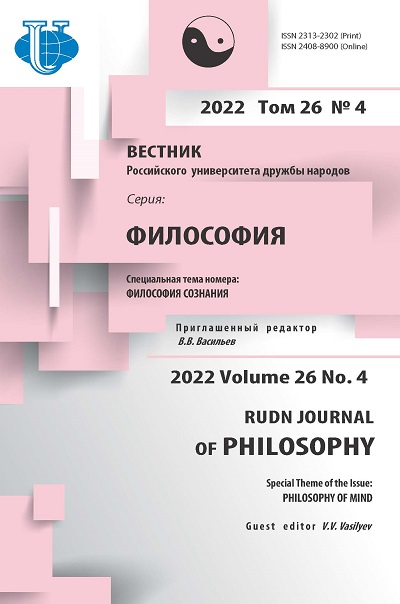Philosophy of Mind: Introduction
- Authors: Vasilyev V.V.1
-
Affiliations:
- Lomonosov Moscow State University
- Issue: Vol 26, No 4 (2022): PHILOSOPHY OF MIND
- Pages: 735-739
- Section: PHILOSOPHY OF MIND
- URL: https://journals.rudn.ru/philosophy/article/view/33094
- DOI: https://doi.org/10.22363/2313-2302-2022-26-4-735-739
- ID: 33094
Cite item
Full Text
Abstract
The introductory article by V.V. Vasilyev, the guest editor of the thematic section on “Philosophy of Mind”, offers a general vision on the researches of mind and consciousness today, gives a brief overview of the articles presented in the issue, and outlines the horizon for the development of both interdisciplinary and philosophical studies of consciousness.
Full Text
It is hard to argue that research on mind and consciousness is a field that leaves few people indifferent. It is of interest not only to the researchers but also to those who look at it from the outside. Although there are specific interests here as well. Philosophers, for instance, may be interested in whether they, too, may handle the problem of consciousness currently. Or shall modern philosophers be outside observers?
The fact is the experimental sciences are pushing philosophy out of the field of philosophy of mind research. Scientists boldly reason about consciousness from their usual positions. However, this is done not only by scientists themselves but also by philosophers who have come over to their side. By the way, experimental researchers of mind and consciousness have a positive attitude towards philosophers. They say that philosophers give them useful tools as definitions, distinctions, and questions. They may also view positively philosophers’ attempts to interpret the received experimental material received by scientists, although many of them, after some philosophical training, are perfectly capable of doing this themselves. Many assume that, in the 21st century, philosophy of consciousness can play, at best, a service role in its research.
The articles on the philosophy of mind presented in this journal can illustrate this point. They are interesting-even fascinating-texts that, despite their diversity, have one thing in common: they all approach the problem of mind and consciousness from the side of the sciences. I.V. Cherepanov approaches the problem of consciousness from the side of quantum physics, and P.N. Baryshnikov — from the side of information science. I.F. Mikhailov’s article seems to respond to these sentiments and proposes an overview of the newest experimental theories of consciousness. The article of A.A. Zhudina, dedicated to G. Northoff’ neurophilosophy, discusses the project of explaining the phenomena of mind by neuroscience.
Having read the listed articles, the reader will therefore learn many interesting facts and get into the spirit of modern studies of mind, including philosophical ones. Worth noting, however, that the question of the relationship between philosophy and the experimental sciences of consciousness can also be viewed differently. In this different view, philosophy will be not on the periphery, but at the center of the whole field of consciousness research. This position stems from the distinction between the hard and easy problems of consciousness proposed in the late twentieth century by D. Chalmers. The easy problems, solved by the methods of experimental sciences, seem to revolve around the hard problem of consciousness, which only philosophers can solve.
The hard problem of consciousness is the problem of subjective experience, of our private experiences. It may be viewed as a coning of the broader problem of consciousness-body, which, sequentially, is a question regarding the ontological status of consciousness understood as the inner world, the totality of qualia, “phenomenal consciousness” (the problem of consciousness in the sense of “access consciousness,” described by the global workspace metaphor and correlated with the everyday understanding of consciousness—that belongs to the easy problems).
We may break the mind-body problem down into a row of more specific questions since the solution of each allows advancing in solving the general problem and deciding whether it can be construed as the subject core of the philosophy of consciousness. Among the specific considerations are the issues of the physicality of consciousness, whether it is generated by the brain, whether it supervenes on the brain, whether it affects behavior, and why it exists at all. That subject core can be studied by desk research methods, i.e., primarily by conceptual analysis. The middle area of the philosophy of consciousness in such a case will be questions about the structure of consciousness, such as the question about intentionality, consciousness of access, self-consciousness. In this part, experimental material may be more prominent. Finally, interdisciplinary topics, including interpretations of experimental data from other sciences of consciousness, are peripheral to the philosophy of consciousness.
The mentioned interpretations signify a lot. However, let us remember that the philosophy of consciousness may not be limited to such interpretations. It can also speak about consciousness in its voice. It is possible that only on this condition will it be truly heard.
About the authors
Vadim V. Vasilyev
Lomonosov Moscow State University
Author for correspondence.
Email: vadim.v.vasilyev@gmail.com
Doctor of Sc. in Philosophy, Рrofessor, Head of Department of History of Foreign Philosophy 27-4, Lomonosovsky Prospekt, GSP-1, Moscow, 119991, Russian Federation
References
Supplementary files















